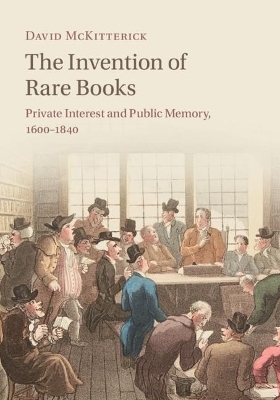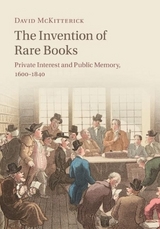The Invention of Rare Books
Cambridge University Press (Verlag)
978-1-108-42832-3 (ISBN)
When does a book that is merely old become a rarity and an object of desire? David McKitterick examines, for the first time, the development of the idea of rare books, and why they matter. Studying examples from across Europe, he explores how this idea took shape in the sixteenth and seventeenth centuries, and how collectors, the book trade and libraries gradually came together to identify canons that often remain the same today. In a world that many people found to be over-supplied with books, the invention of rare books was a process of selection. As books are one of the principal means of memory, this process also created particular kinds of remembering. Taking a European perspective, McKitterick looks at these interests as they developed from being matters of largely private concern and curiosity, to the larger public and national responsibilities of the first half of the nineteenth century.
David McKitterick, FBA, was for many years Librarian of Trinity College, Cambridge, and Honorary Professor of Historical Bibliography at Cambridge. His previous publications include the three volume A History of Cambridge University Press (Cambridge, 1992–2004), Cambridge University Library: A History, Volume 2: The Eighteenth and Nineteenth Centuries (Cambridge, 1986), Print, Manuscript and the Search for Order, 1450–1830 (Cambridge, 2003), and most recently Old books, New Technologies (Cambridge, 2013). Professor McKitterick is one of the general editors of the Cambridge History of the Book in Britain.
1. Inventio; 2. Books as objects; 3. Survival and selection; 4. Choosing books in Baroque Europe; 5. External appearances (1); 6. External appearances (2); 7. Printers and readers; 8. A seventeenth-century revolution; 9. Concepts of rarity; 10. Developing measures of rarity; 11. Judging appearances by modern standards; 12. The Harleian sales; 13. Authority and rarity; 14. Rarity established; 15. The French bibliographical revolution; 16. Books in turmoil; 17. Bibliophile traditions; 18. Fresh foundations; 19. Public faces, public responsibilities; 20. Conclusion.
| Erscheinungsdatum | 05.09.2018 |
|---|---|
| Zusatzinfo | Worked examples or Exercises; 22 Halftones, black and white |
| Verlagsort | Cambridge |
| Sprache | englisch |
| Maße | 182 x 253 mm |
| Gewicht | 1070 g |
| Themenwelt | Geisteswissenschaften ► Sprach- / Literaturwissenschaft ► Anglistik / Amerikanistik |
| Geisteswissenschaften ► Sprach- / Literaturwissenschaft ► Literaturgeschichte | |
| Sozialwissenschaften ► Kommunikation / Medien ► Buchhandel / Bibliothekswesen | |
| ISBN-10 | 1-108-42832-0 / 1108428320 |
| ISBN-13 | 978-1-108-42832-3 / 9781108428323 |
| Zustand | Neuware |
| Haben Sie eine Frage zum Produkt? |
aus dem Bereich




